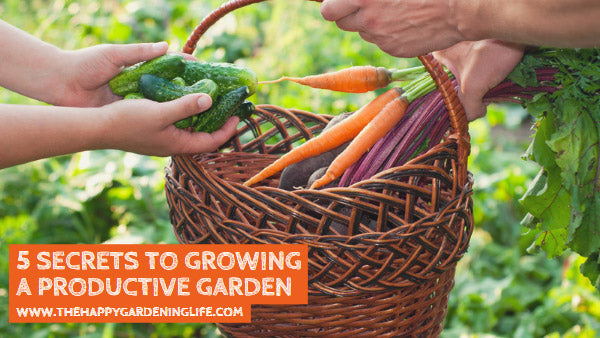
5 Secrets to Growing a Productive Garden
Share

Making mistakes is part of being a home gardener, but sometimes even the simplest of errors can lead to a disastrous garden. It’s easy to get frustrated when this happens especially when you’ve already invested lots of time and effort in gardening.
Some gardeners have no choice but to start again from scratch just to get their vegetable gardens back on the right track.
You can avoid this situation though by applying certain tricks that will help you attain a more productive garden.
By carefully planning which organic vegetable varieties to grow, adding organic fertilizer and compost in the soil, growing seasonally, and using good bugs to your advantage, you will be able to maximize production in your garden.
So if you want to have a successful vegetable garden of your own, make sure to follow these 5 excellent gardening secrets below. Remember to click on the social buttons to share this info with your online friends!
5 Quick and Easy Ways for a More Productive Garden
1. Healthy soil.
It all starts with the soil. You need nutrient and microbe rich soil. Chemical herbicide, pesticides and fertilizers all kill microbes and worms scatter when chemicals are applied. For alive soil, use organic, natural fertilizers and compost. Apply both in early spring so the nutrition can seep into the soil, ready to nourish the seeds and plants you put in the ground.
2. Smart garden plan.
You can maximize the production of the plants you put in your garden with a well thought out plan. Plant your veggies in the right season and you will be rewarded with healthy plants and bountiful harvests. Before you plant, check the heights and sun requirements. Plant the tallest plants in the back so they don’t shade out the shorter sun loving plants. Using trellis for vertical gardening of cucumbers, beans, and peas is a great use of space at the back of the garden bed.
3. Choose wisely.
Choose the most productive varieties to maximize the production per square foot of space. Dwarfs are a great choice for small spaces and containers. You can get the same production from many dwarfs as you can the full size varieties. Some great choices are cucumbers, pole beans and peas, zucchini, tomatoes, peppers, and many varieties of greens.
4. Think for season gardening.
Use as much of all four seasons as possible. Start seeds indoors in late winter to get an early start on spring and summer. You can plant out as soon as the weather is willing. Help heat up the soil so your plants or seeds get a jump start when planted. You can put down plastic or cloches where you want to plant to help get the soil warm. You can also cover your seedlings with a row cover or cloche after planting to keep the warmth of the sun past sundown. Be careful with cloche’s as they can get really hot and fry your plants. Also look for varieties that are adapted to the season.
5. Eliminate competition.
Use mulch to keep weeds suppressed. Mulch does triple duty as a fresh coat of mulch in the spring can help warm the soil, helps keep moisture from evaporating during the summer, adds organic matter while suppressing weeds. There are good bugs and bad bugs. Attract the good bugs by interplanting your veggies with flowers like marigolds and calendula. Good bugs help pollinate your veggies, increasing yields.
Article Source: motherearthnews.com
